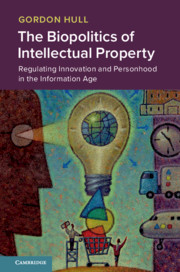 The Biopolitics of Intellectual Property
The Biopolitics of Intellectual Property 4 - Trademark
Published online by Cambridge University Press: 01 November 2019
Summary
This chapter treats developments in trademark in the context of the development of brand capitalism.Traditional trademark analysis displayed the features of a public biopolitics; developments around branding push it in a neoliberal direction.I focus on three developments.The first is trademark dilution, which protects brands as valuable in themselves. An extended analysis of Victoria’s Secret’s successful attempt to shut down a sex-toy shop that called itself “Victor’s Little Secret” shows how dilution also functions as a kind of subjectification.The second is a recent Supreme Court case ruling that, PTO rules against registration of disparaging trademarks violated the First Amendment.The result transfers power to brand owners.The third is the use of Geographic Indicators to protect “traditional” cultural indicia.This resistance strategy is a difficult one, as it risks entrenching conservative and stereotypical views of cultural groups, often at the expense of dissident forms. It thus illustrates an unexpected way that branding can function as a form of subjectification, and the potential limits of using trademarks and branding as strategies of resistance.
Keywords
- Type
- Chapter
- Information
- The Biopolitics of Intellectual PropertyRegulating Innovation and Personhood in the Information Age, pp. 98 - 141Publisher: Cambridge University PressPrint publication year: 2020
